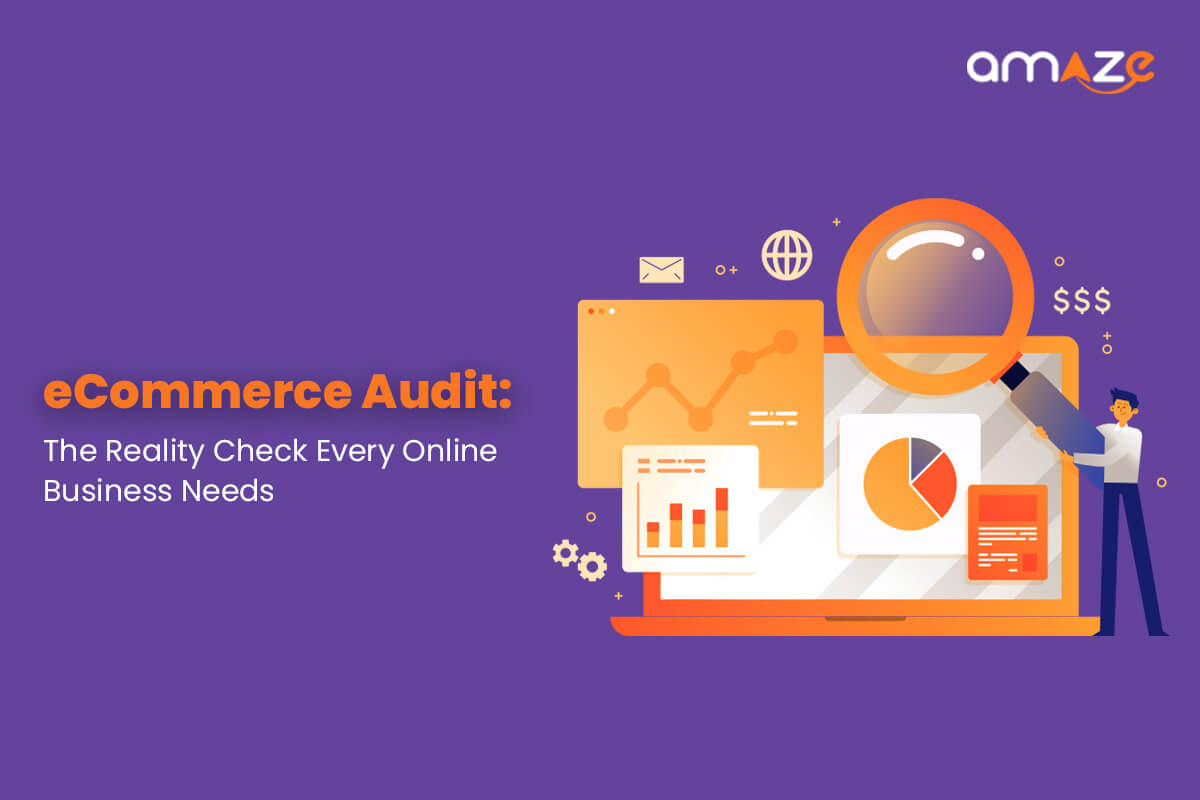eCommerce Audit: The Reality Check Every Online Business Needs

Around 2.14 billion people bought goods or services online in 2021 (Statista). This amounts to about a third of the global population. In fact, it is estimated that about 95% of all purchases will be made online by 2040 (Nasdaq). “That’s a massive opportunity” would be a fair assessment of the future of eCommerce in a very digital future.
But is it enough to merely have an online presence to make the most of this opportunity?
The increasing influence of the next generation, or Gen-Z, has made it amply clear that merely taking a business online doesn’t guarantee success. Yes, there is the scope for increased reach and wider geographical appeal, but these advantages quickly wither away if businesses don’t offer a great online experience to online shoppers.
With so many variables at play, it is integral for businesses to get a realistic, objective, quantifiable assessment of their eCommerce website. And this is exactly what an eCommerce experience (PXM) audit delivers. eCommerce audits give an objective assessment of different aspects of your website, whether it’s SEO, website navigation, content or conversion.
If conducted correctly, an eCommerce product experience audit doesn’t just tell you what’s wrong/not working with your website, it also gives you the right levers to create a comprehensive roadmap to improvement and success.
Why get an eCommerce Product Experience Audit
Apart from getting a high-level understanding of where your website stands, an eCommerce audit can impact your business in more ways than one. Here’s a low-down on some of the leading reasons to go for an audit:
Enhanced Product Experience At the top of the value chain is the prospect of improving the online product experience with an eCommerce website and marketplace product page audit. The design and functionality of your website are limited by your and your team’s imagination. As much as you do to make the website ideal for end-users, it’s value in terms of usability and experience can only be gauged correctly from an outsider’s perspective. There are many ways in which your website can make visitors feel welcome and confident of finding what they’re looking for. Easy discovery of products through search or navigation, product details, images and reviews make for a great online shopping experience. If this element is lacking, they are bound to bounce off to other pages, with the possibility of them never returning. A website audit can help you identify areas of improvement and play a vital role in improving customer experience (CX). Share this as a Tweet
Audit Product Experience
Get a free, end-to-end audit of your online product experience to understand how your business is doing from the customer journey point of view. What works, what doesn’t, and all the insights in between!

Better Content A technical audit of your website will give you visibility of various parameters including page views, time on site, bounce rates, etc. This plays a vital role in SEO performance. However, more importantly, whether its search engines or people, the true value of your website is built on the value of your content. This entails everything from descriptions, images and videos to taxonomy and attribution. With a comprehensive product information audit, you can get a clearer understanding of which content works, and which doesn’t. A PIM audit can help you chart data-driven content strategy, which will turn to better search engine performance and happier customers.
- Improved SEO SEO has changed drastically over the past few years. Search engines keep updating their search algorithms and this makes it imperative for websites to adapt to these changes as well. While an SEO strategy may be great at a point in time, it is bound to be rendered obsolete after a few years. However, as an eCommerce audit will tell you, a website can’t be all about pleasing the search engine. A search engine rates websites higher when they serve audiences better. A thorough audit of your website will, therefore, give you insights into elements of your website that impact SEO, but from the user-friendliness point of view. And this should, at all times, be the key driver of your SEO efforts.
- Boost in Sales/Conversion The bottom line is what matters the most to any business, and this is probably why you’re considering an eCommerce audit in the first place. It is therefore integral for the audit to include all the above-mentioned steps (SEO, content and UX audits), and put them in perspective to ensure that your top pages have the right mix of these elements. This, obviously, should be done from the lens of improving ROI, apart from improving customer experience and increasing brand value. This could take months of testing and analysis to get right, but once you crack it, the juice is most certainly worth the squeeze.
What Kind of an Audit Does Your Website Need?
“Audit” is a rather broad term for the kind of analysis that can be run on your website. While some organizations go for a 360-degree approach, others run rather specific audits for targeted areas. These are some of the most effective types of eCommerce audits you can find:
- Platform Audit While there may be no direct indication of the efficacy of your eCommerce platform, there are tell-tale signs of PIM / PXM platform issues, most of which, usually start from less-than-desirable sales. A thorough platform audit will tell you if this is being caused by poor integration capabilities that disrupt content quality across channels, below-par functional capabilities that increase time-to-market and other variables, and so on. Then again, a platform audit can also make you aware of missing features, or even redundant features that you pay for but don’t need.
Selecting a platform, or for that matter, switching from one platform to the other, can be a daunting decision. A thorough audit gives you a granular understanding of the suitability of a platform for your business, enabling better decision making. - Search Engine Optimization (SEO) Audit Customers rarely go beyond the top 3-5 search results on a search engine results page (SERP), leave aside anything beyond the first page. And getting to these ranks doesn’t happen by fluke. An SEO audit looks into all the moving parts including authority, content quality, keyword usage, links etc. to determine a website’s SEO performance. These are some of the key areas that an SEO audit touches upon:
- Are keywords used appropriately (without overusing them)?Are the product taxonomy and schema structures in accordance with product category and segmentation designed by marketplace?Is the internal linking structure intuitive?Are products organized and managed correctly?Are digital assets (images, videos etc.) used to full potential and tagged correctly?Is the website secure (SSL certification, etc.) and error-free (404 errors, etc.)?Does the website have duplicate content or filler content?Is the website speed up to the mark?Is the website optimized for mobile?
As you peck away at these issues, website authority on search engines rises up drastically, lending the much-required air of legitimacy and credibility to your online presence. - Content Audit The cliché “content is king” is a cliché for a reason; because it’s true. Whether its product descriptions, blogs, user generated content or FAQs, content lays the foundation for your eCommerce presence and success. Unlike other types of audits, a content audit requires a two-pronged approach to assess technical aspects as well as stylistic ones. From the stylistic point of view, your website copy must be written in the tone and voice that connects with your customer base. The same goes for image and video treatment, and every other aspect of your website that visitors interact with. From the technical point of view, taxonomy, schema, attribution and everything in between should be spot on. This audit will give you a clear assessment of whether you’re talking to the right audience, providing all the required information, and also reflecting your brand values to the tee.
88% of online shoppers state that they won’t give a website a second chance after a poor user experience (Amazon Web Services) - User Experience (UX) Audit Good UX makes visitors’ stay smooth, intuitive and purposeful on a website. Poor UX, on the other hand, seems cumbersome and eventually leads to frustration – a factor that will keep visitors from returning to your page. With a UX audit, you can answer key questions such as:
- Can visitors use your website with ease?Are product and service pages organized intuitively?Is the website easily accessible and understandable?Is the call-to-action (CTA) clear, logically placed and easy to spot?Is the user journey linear, comprehensive and easy to undertake?
- Conversion Rate Optimization (CRO) Audit Like all roads lead to Rome, most of the above audits have the same eventual intent – improved conversion. However, there still exist dedicated elements that play a vital role in driving conversion, and a thorough CRO audit can bring them to light. These are some of the key drivers of conversion to expect with a CRO audit:
- Does the website have personalization and/or product recommendation mechanisms?
- Are CTA buttons clearly visible?
- Can customers track order completion with a progress bar?
- Does the check-out page look professional, reliable and equipped with security-related prompts?
- Are there clear error prompts to bring incomplete fields to the attention of the user?
Who Can You Trust with This Mammoth Task?
There exists no one-size-fits-all eCommerce audit
While many organizations conduct eCommerce audits in-house, this pretty much beats the purpose. If organizations are aware of things they’re doing wrong, the assumption is that they wouldn’t need an audit in the first place.
What you need is an outsider’s view, a bird’s-eye-view, an expert’s view; and this is something only a third-party service provider can bring to the table. This should ideally be one who has both, industry-specific and industry-agnostic knowledge of how eCommerce works, and extensive experience and a proven track record to go along. Here are a few other qualities to look for in a third-party vendor for an effective eCommerce audit:
An eCommerce audit is a wide and nebulous activity; almost as extensive as auditing your business itself. With as many moving parts, you need an expert to help you cut the clutter. If this is what you’re looking for, and wondering how to get started, get in touch with our eCommerce experts at Amaze PXM.
Related Articles
Recent Post
Categories





